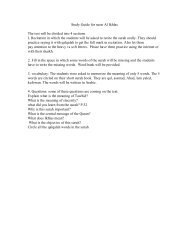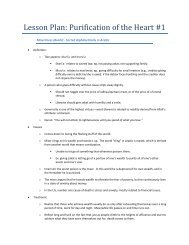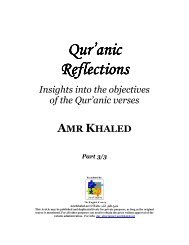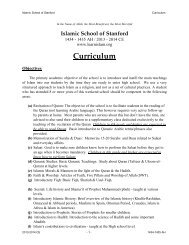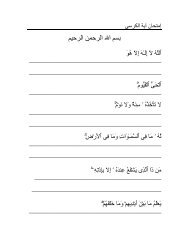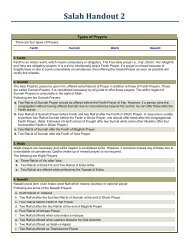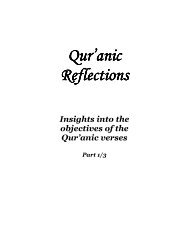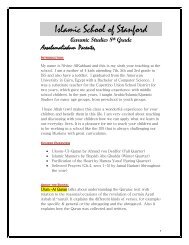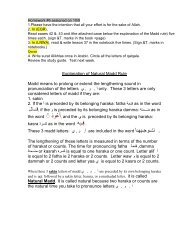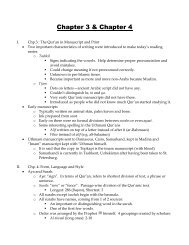Quranic Reflections - Islamic School of Stanford
Quranic Reflections - Islamic School of Stanford
Quranic Reflections - Islamic School of Stanford
Create successful ePaper yourself
Turn your PDF publications into a flip-book with our unique Google optimized e-Paper software.
(this Qur’an and Muhammad SAWS) and said: “I shall certainly be given wealth<br />
and children [if I will be alive (again)].” (TMQ, 19:77). On the one hand, a child<br />
might be a blessing, a good remembrance, and a Sadaqa (regular charity) for the<br />
parents. On the other hand, he or she might be a reason for the parents’ disbelief and<br />
disobedience. The Surah emphasizes the same point : one shouldn’t wish to become a<br />
parent only for its own sake but for the sake <strong>of</strong> religion as well.<br />
Allah (SWT)<br />
The Ayahs then move to another meaning; you people need to have children, but<br />
Allah (SWT) is never in need for them. The Surah rebukes those who claim that Allah<br />
(SWT) has a son, be He glorified and exalted. Allah (SWT) says what can be translated<br />
as, “And they say: “The Most Gracious (Allah) has begotten a son (or <strong>of</strong>fspring<br />
or children) [as the Jews say: ‘Uzair (Ezra) is the son <strong>of</strong> Allah, and the<br />
Christians say that He has begotten a son [‘Isa (Jesus) AS], and the pagan Arabs<br />
say that He has begotten daughters (angels and others.)]. Indeed you have<br />
brought forth (said) a terrible evil thing. Whereby the heavens are almost torn,<br />
and the earth is split asunder, and the mountains fall in ruins, that they ascribe a<br />
son (or <strong>of</strong>fspring or children) to the Most Gracious (Allah). But it is not suitable<br />
for (the Majesty <strong>of</strong>) the Most Gracious (Allah) that He should beget a son (or<br />
<strong>of</strong>fspring or children). There is none in the heavens and the earth but comes unto<br />
the Most Gracious (Allah) as a slave. Verily He knows each one <strong>of</strong> them, and has<br />
counted them a full counting. And every one <strong>of</strong> them will come to Him alone on<br />
the Day <strong>of</strong> Resurrection (without any helper, or protector or defender).” (TMQ,<br />
19:88-95).<br />
The same Surah refers to people’s insistent need for children, yet denies that Allah<br />
(SWT) needs to have a child, because He (SWT) is the Ever Living. People need to<br />
have children because they get old and eventually die.<br />
Waves and breezes<br />
The first section in the Surah focuses on man’s need to have children and <strong>of</strong>fspring.<br />
Thus, the Ayahs were so tender in referring to this, while the endings <strong>of</strong> the syllables<br />
are strong, “(This is) a mention <strong>of</strong> the mercy <strong>of</strong> your Lord to His slave Zakariya.<br />
When he called out his Lord (Allah) a call in secret… as a mercy (or a grant)<br />
from Us”. (TMQ, 19:2-3, 13).<br />
This Surah is one among many in the Holy Qur’an to refer to the word “mercy” and<br />
Allah’s (SWT) name “the Compassionate”. The word “mercy” and its derivatives are<br />
mentioned 20 times in this Surah.<br />
As for the second section <strong>of</strong> the Surah, it denies the claim that Allah (SWT) has a son<br />
in strong and forceful words. This suits the fabrication made by some people,<br />
claiming that Allah (SWT) has a son. Hence, the Surah uses both tender and harsh<br />
language without changing the cadence <strong>of</strong> the Surah or the effects it has on the reader,<br />
which proves the miraculous nature <strong>of</strong> the Holy Qur’an.<br />
Why was the Surah named Maryam



